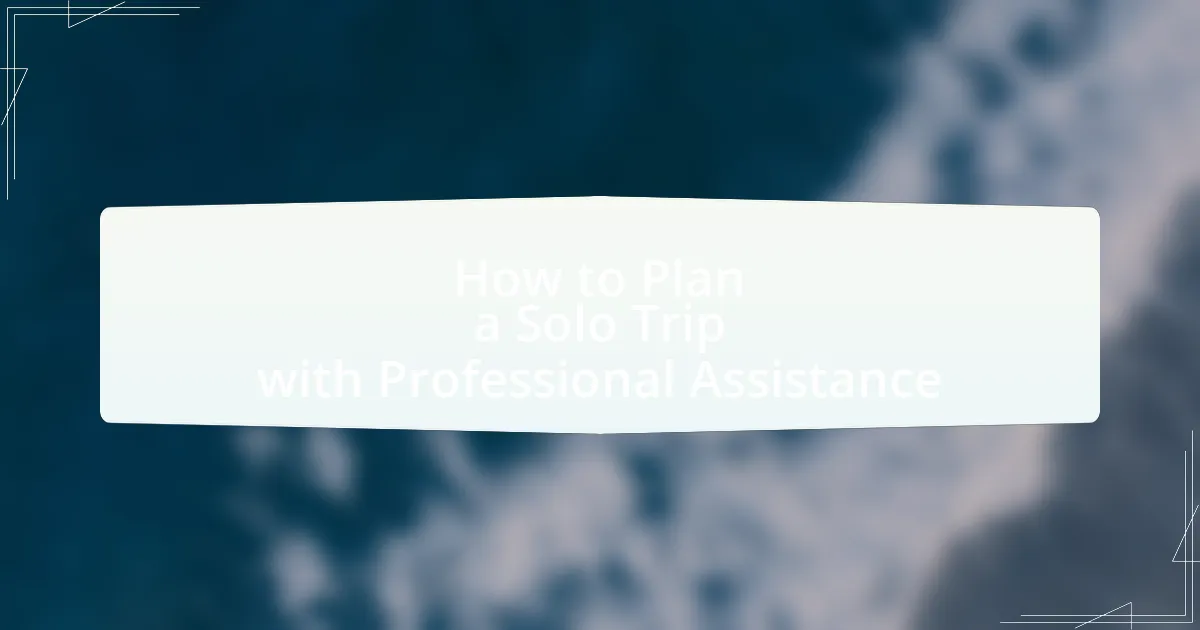The article focuses on the process of planning a solo trip with professional assistance, emphasizing the benefits of engaging travel experts for itinerary creation, accommodation booking, and transportation arrangements. It highlights how professional services can enhance the solo travel experience through personalized recommendations, safety measures, and logistical support. The article also outlines the types of professional services available, the steps involved in selecting the right travel agency, and common challenges faced during the planning process. Additionally, it addresses misconceptions about using professional assistance and provides practical tips for maximizing the benefits of such services while maintaining flexibility during travel.

What does it mean to plan a solo trip with professional assistance?
Planning a solo trip with professional assistance means engaging travel experts or agencies to help organize and manage the logistics of the journey. This includes itinerary creation, accommodation booking, transportation arrangements, and providing local insights, which enhances the travel experience and ensures safety. Professional assistance can also offer tailored recommendations based on individual preferences, making the trip more enjoyable and efficient.
How can professional assistance enhance the solo travel experience?
Professional assistance can significantly enhance the solo travel experience by providing expert guidance, personalized itineraries, and safety measures. Travel professionals possess extensive knowledge of destinations, enabling them to recommend unique experiences that align with individual preferences. For instance, a travel advisor can curate a tailored itinerary that includes local attractions, dining options, and cultural activities, ensuring a more enriching experience. Additionally, professional assistance often includes support with logistics, such as booking accommodations and transportation, which can alleviate stress and save time. According to a study by the American Society of Travel Advisors, 86% of travelers who used a travel advisor reported a higher satisfaction level with their trips compared to those who planned independently. This statistic underscores the value of professional assistance in enhancing the overall quality of solo travel.
What types of professional services are available for solo travelers?
Solo travelers can access various professional services, including travel planning agencies, guided tours, and personal concierge services. Travel planning agencies specialize in creating customized itineraries that cater to individual preferences, ensuring a tailored experience. Guided tours provide solo travelers with the opportunity to explore destinations alongside other travelers, enhancing safety and social interaction. Personal concierge services offer assistance with bookings, reservations, and local recommendations, allowing solo travelers to navigate unfamiliar environments with ease. These services collectively enhance the solo travel experience by providing support, safety, and personalized attention.
How do travel agencies cater specifically to solo travelers?
Travel agencies cater specifically to solo travelers by offering tailored packages that address their unique needs, such as safety, social opportunities, and flexible itineraries. These agencies often provide group tours designed for solo travelers, allowing them to meet others while exploring new destinations. Additionally, they may offer single occupancy options to avoid extra fees, and personalized travel planning services that consider individual preferences and interests. According to a report by the Adventure Travel Trade Association, 40% of travelers are interested in solo travel experiences, highlighting the growing demand for such services.
Why should one consider professional assistance when planning a solo trip?
One should consider professional assistance when planning a solo trip to ensure a well-organized and safe travel experience. Travel professionals possess extensive knowledge of destinations, including local customs, safety concerns, and logistical details that can significantly enhance the trip. For instance, a study by the American Society of Travel Advisors found that 86% of travelers who used a travel advisor reported a more enjoyable experience compared to those who planned independently. This indicates that professional assistance can lead to better trip outcomes through expert guidance and personalized itineraries.
What are the potential risks of solo travel that professional assistance can mitigate?
Professional assistance can mitigate several potential risks of solo travel, including safety concerns, logistical challenges, and health emergencies. Safety risks, such as theft or personal harm, can be reduced through the guidance of travel experts who provide insights on safe destinations and local customs. Logistical challenges, like navigating transportation or accommodation issues, can be addressed by travel professionals who offer pre-arranged itineraries and support. Health emergencies, including access to medical care or understanding local health regulations, can be managed through professional assistance that ensures travelers have necessary information and resources readily available.
How can professional assistance save time and reduce stress in trip planning?
Professional assistance can save time and reduce stress in trip planning by streamlining the entire process through expert knowledge and resources. Travel professionals have access to exclusive deals, insider information, and efficient booking systems that can significantly cut down on the time spent researching and organizing travel details. For instance, a study by the American Society of Travel Advisors found that travelers who use professional services save an average of 10 hours in planning time compared to those who plan independently. Additionally, these experts can handle unexpected issues, such as flight cancellations or itinerary changes, providing peace of mind and allowing travelers to focus on enjoying their trip rather than managing logistics.

What steps are involved in planning a solo trip with professional assistance?
Planning a solo trip with professional assistance involves several key steps. First, identify your travel goals and preferences, such as destination, budget, and activities. Next, research and select a reputable travel agency or consultant that specializes in solo travel. After that, schedule a consultation to discuss your needs and expectations, allowing the professional to tailor a personalized itinerary. The travel expert will then provide options for accommodations, transportation, and activities, which you can review and adjust as necessary. Finally, confirm your bookings and ensure you have all necessary travel documents and insurance in place. This structured approach ensures a well-organized and enjoyable solo travel experience.
How do you choose the right professional assistance for your solo trip?
To choose the right professional assistance for your solo trip, evaluate the expertise and reputation of travel agencies or guides specializing in solo travel. Look for agencies with positive reviews and testimonials from solo travelers, as this indicates their ability to cater to individual needs. Additionally, verify their credentials, such as certifications from recognized travel organizations, which can assure you of their professionalism and reliability. Researching their experience in your desired destination can further confirm their suitability, as local knowledge enhances the quality of assistance provided.
What factors should you consider when selecting a travel agency or consultant?
When selecting a travel agency or consultant, consider their experience and expertise in your desired destination. Agencies with a proven track record in specific regions often provide better insights and tailored services. Additionally, evaluate customer reviews and testimonials, as they reflect the agency’s reliability and service quality. According to a 2021 survey by the American Society of Travel Advisors, 87% of travelers reported that personal recommendations significantly influenced their choice of travel agency. Furthermore, assess the range of services offered, including itinerary customization, support during travel, and emergency assistance, as these factors contribute to a smoother travel experience.
How can reviews and testimonials influence your choice of professional assistance?
Reviews and testimonials significantly influence the choice of professional assistance by providing insights into the experiences of previous clients. These evaluations help potential clients assess the reliability, quality, and effectiveness of services offered by professionals. For instance, a study by BrightLocal in 2022 found that 87% of consumers read online reviews for local businesses, indicating that positive testimonials can enhance trust and credibility. Furthermore, detailed reviews often highlight specific strengths or weaknesses of a service, allowing individuals to make informed decisions based on their unique needs for planning a solo trip.
What are the key components of a well-planned solo trip?
The key components of a well-planned solo trip include thorough research, a detailed itinerary, budget management, safety considerations, and flexibility. Thorough research involves understanding the destination’s culture, attractions, and local customs, which enhances the travel experience. A detailed itinerary outlines daily activities, accommodations, and transportation, ensuring efficient use of time. Budget management is crucial, as it helps in tracking expenses and making informed decisions about accommodations and activities. Safety considerations, such as knowing emergency contacts and local laws, are essential for personal security. Lastly, flexibility allows for spontaneous experiences and adjustments to plans, which can lead to memorable moments. These components collectively contribute to a successful solo travel experience.
How do you create an itinerary that balances exploration and relaxation?
To create an itinerary that balances exploration and relaxation, start by allocating specific time blocks for both activities. For instance, designate mornings for exploration, such as visiting local attractions or engaging in outdoor activities, while reserving afternoons for relaxation, like enjoying a spa or leisurely meals. Research indicates that a balanced approach enhances overall travel satisfaction, as travelers report higher enjoyment levels when they mix active and restful experiences. By planning a mix of structured activities and free time, you ensure a fulfilling trip that caters to both adventure and downtime.
What role does budgeting play in planning a solo trip with professional help?
Budgeting is essential in planning a solo trip with professional help as it determines the scope and feasibility of the travel experience. A well-defined budget allows travelers to allocate funds for transportation, accommodation, activities, and meals, ensuring that all aspects of the trip are financially covered. According to a study by the Global Business Travel Association, effective budgeting can lead to a 20% reduction in overall travel costs when managed properly. This financial planning enables travelers to make informed decisions, prioritize experiences, and avoid overspending, ultimately enhancing the overall enjoyment and success of the trip.

What are the common challenges faced when planning a solo trip with professional assistance?
Common challenges faced when planning a solo trip with professional assistance include miscommunication, lack of personalization, and budget constraints. Miscommunication can arise when the travel agent does not fully understand the traveler’s preferences or expectations, leading to unsatisfactory arrangements. Lack of personalization occurs when the professional assistance provided does not cater to the unique interests or needs of the solo traveler, resulting in a generic experience. Budget constraints can limit the options available, as professional services often come with additional fees that may not align with the traveler’s financial plan. These challenges can hinder the overall satisfaction and success of the solo trip.
How can communication issues arise between solo travelers and professionals?
Communication issues can arise between solo travelers and professionals due to differences in expectations and language barriers. Solo travelers may have specific needs or preferences that professionals, such as travel agents or guides, might not fully understand without clear communication. For instance, a traveler might expect personalized recommendations based on their interests, while a professional may provide generic options. Additionally, language barriers can lead to misunderstandings, where the traveler’s requests or concerns are not accurately conveyed or interpreted. Research indicates that effective communication is crucial in the travel industry, as miscommunication can result in dissatisfaction and unmet expectations.
What strategies can help ensure clear communication with your travel planner?
To ensure clear communication with your travel planner, establish specific goals and preferences upfront. Clearly articulating your travel objectives, such as budget, destinations, and activities, allows the planner to tailor their services effectively. Regular check-ins and updates throughout the planning process further enhance clarity, as they provide opportunities to address any questions or adjustments needed. Additionally, utilizing tools like shared documents or travel apps can facilitate real-time collaboration and information sharing, ensuring both parties remain aligned. These strategies are supported by research indicating that effective communication significantly improves client satisfaction in travel planning, as noted in studies by the Travel Industry Association.
How can you effectively convey your preferences and needs to professionals?
To effectively convey your preferences and needs to professionals, clearly articulate your expectations and specific requirements during initial discussions. This involves preparing a list of your priorities, such as budget, destinations, activities, and any special considerations like dietary restrictions or accessibility needs. Research shows that clear communication enhances collaboration; for instance, a study by the Project Management Institute indicates that effective communication can improve project success rates by up to 20%. By being direct and detailed, you enable professionals to tailor their services to meet your unique needs, ensuring a more satisfying outcome for your solo trip planning.
What are the common misconceptions about using professional assistance for solo travel?
Common misconceptions about using professional assistance for solo travel include the belief that it is excessively expensive, that it limits personal freedom, and that it is only for inexperienced travelers. Many assume that hiring a travel agent or using a travel service will significantly increase costs; however, professionals often have access to exclusive deals and can save travelers money through their networks. Additionally, some think that using professional assistance restricts their ability to explore independently, but many services offer customizable itineraries that allow for personal exploration alongside guided experiences. Lastly, the notion that professional assistance is only beneficial for novices overlooks the fact that even seasoned travelers can benefit from expert insights, logistical support, and local knowledge, enhancing their overall travel experience.
How can understanding these misconceptions improve your planning experience?
Understanding misconceptions about solo travel can significantly enhance your planning experience by allowing you to make informed decisions and avoid common pitfalls. For instance, many travelers mistakenly believe that solo trips are inherently unsafe; however, research shows that solo travel can be just as safe as traveling with others when proper precautions are taken. By recognizing this misconception, travelers can focus on effective safety strategies rather than being deterred by fear. Additionally, understanding that professional assistance can provide tailored advice and support can lead to a more enjoyable and streamlined planning process, as it helps individuals leverage expert knowledge to create personalized itineraries. This clarity ultimately fosters confidence and reduces anxiety, making the overall planning experience more efficient and enjoyable.
What practical tips can enhance your solo trip planning with professional assistance?
To enhance your solo trip planning with professional assistance, utilize travel agencies that specialize in solo travel, as they offer tailored itineraries and expert advice. These agencies often have access to exclusive deals and local insights, which can significantly improve your travel experience. For example, companies like Intrepid Travel provide group tours specifically designed for solo travelers, ensuring safety and social opportunities while exploring new destinations. Additionally, leveraging online platforms such as TripAdvisor or Lonely Planet can help you gather reviews and recommendations from other solo travelers, further refining your planning process.
How can you maximize the benefits of professional services during your trip?
To maximize the benefits of professional services during your trip, engage with experts who specialize in travel planning and local experiences. Utilizing travel agents or concierge services can provide tailored itineraries that align with your interests, ensuring you access exclusive deals and insider knowledge. For instance, a study by the American Society of Travel Advisors found that travelers who use professional services save an average of 20% on their trip costs due to negotiated rates and packages. Additionally, leveraging local guides can enhance your experience by offering cultural insights and access to hidden gems that are not typically found in guidebooks.
What are the best practices for maintaining flexibility while using professional assistance?
The best practices for maintaining flexibility while using professional assistance include setting clear expectations, allowing for open communication, and being adaptable to changes. Clear expectations ensure that both the traveler and the professional understand the scope of services and potential adjustments. Open communication fosters a collaborative environment where feedback can be shared, enabling quick adaptations to plans. Additionally, being adaptable allows travelers to embrace unexpected opportunities or changes, enhancing the overall experience. These practices are supported by studies indicating that effective communication and adaptability significantly improve satisfaction in travel planning.

Leave a Reply